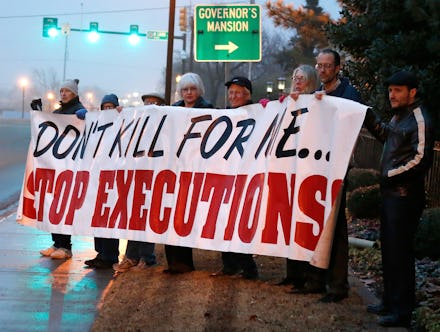Support for the Death Penalty Is at Its Lowest In Decades

The news: The much-publicized, botched execution of an Oklahoma inmate in April launched a national discussion about the death penalty. Since then, it looks like Americans are having second thoughts about the practice, which the U.S. carries out at a rate that puts it behind Saudi Arabia, Iraq, Iran and China in terms of highest numbers of executions.
On Thursday, Gallup released its latest poll on support for the death penalty in the U.S., and the picture is clear: While the majority of Americans are still in favor of executions for convicted murderers, it has the lowest level of support in decades:
Support for capital punishment remains divided across party lines, with Democrats the most likely to oppose it. Still, every political group polled in the survey gained statistically significant opposition to the death penalty since 1994:
"Democrats are mostly responsible for this shift in attitudes, and thus it is not surprising that most of the states that have abolished the death penalty in recent years are Democratic leaning," Gallup explains. "The death penalty is another example of how Democrats' and Republicans' opinions on political matters have become increasingly divergent compared with recent decades, including their views of the job the president is doing and on issues such as global warming and labor unions."
In spite of these changing attitudes, the majority of Americans still prefer the death penalty over life imprisonment for convicted murderers:
Again, Democrats were more likely to support the latter over the former, although all three political groups experienced a similar trend:
And the arguments have basically remained the same. Though less and less of the country has supported the practice in recent decades, the most popular reasons for support haven't changed: People believe that it's a fitting "an eye for an eye" punishment, and that it saves money in the long run.
And the most popular oppositions to the death penalty similarly remain the same, with the top reasons being that it's wrong to take a life and that there is the possibility of executing someone who has been wrongly convicted:
These are big arguments to consider. Leaving aside the conflict over morality, it's concerning that money is the second biggest factor for supporters of capital punishment, considering that studies have consistently shown it's actually cheaper to sentence inmates to life imprisonments than it is to carry out executions.
And death penalty opponents' second most popular reason, that there is the possibility of executing a wrongly convicted inmate, has real grounds for concern: A study published last year in the Proceedings of the National Academy of Sciences found that the rate of false convictions for defendants sentenced to death was at least 4.1% — a number that should make anyone feel uncomfortable. You only have to look at the list of exonerated death row inmates to put the faces to these numbers.
And of course, it's important to factor in all the problems in carrying out the practice that have led to horrific incidents, such as the botched Oklahoma execution.
The slow increase in opposition to the death penalty shows Americans are open to changing their minds on the efficacy of the practice. Now the question is, will we have an open debate that re-examines capital punishment's role in our society and whether the arguments justifying it really hold true? A frank discussion could not only save money, but lives.